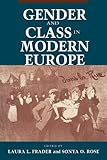Gender and Class in Modern Europe / ed. by Sonya O. Rose, Laura L. Frader.
Material type: TextPublisher: Ithaca, NY : Cornell University Press, [2018]Copyright date: ©1996Description: 1 online resource (376 p.) : 32 halftones, 6 tablesContent type:
TextPublisher: Ithaca, NY : Cornell University Press, [2018]Copyright date: ©1996Description: 1 online resource (376 p.) : 32 halftones, 6 tablesContent type: - 9781501724183
- 331.4094
- HD6134
- online - DeGruyter
| Item type | Current library | Call number | URL | Status | Notes | Barcode | |
|---|---|---|---|---|---|---|---|
 eBook
eBook
|
Biblioteca "Angelicum" Pont. Univ. S.Tommaso d'Aquino Nuvola online | online - DeGruyter (Browse shelf(Opens below)) | Online access | Not for loan (Accesso limitato) | Accesso per gli utenti autorizzati / Access for authorized users | (dgr)9781501724183 |
Frontmatter -- Contents -- Acknowledgments -- Introduction: Gender and the Reconstruction of European Working-Class History -- I RETHINKING PROLETARIANIZATION -- 1. Gender and Uneven Working -Class Formation in the Irish Linen Industry -- 2. What Price a Weaver's Dignity? Gender Inequality and the Survival of Home-Based Production in Industrial France -- 3. The Gendering of Skill as His tori cal Process: The Case of French Knitters in Industrial Troyes, I880-1939 -- II PUBLIC AND PRIVATE IN WORKING-CLASS HISTORY -- 4. Consumption, Production, and Gender: The Sewing Machine in Nineteenth-Century France -- 5. Engendering Work and Wages: The French Labor Movement and the Family Wage -- 6. Women "of a Very Low Type": Crossing Racial Boundaries in Imperial Britain -- III GENDER, CLASS, AND THE STATE -- 7. Protective Labor Legislation in Nineteenth-Century Britain: Gender, Class, and the Liberal State -- 8. Social Policy, Body Politics: Recasting the Social Question in Germany, 1875-1900 -- 9. Republican Ideology, Gender and Class: France, 1860s-1914 -- IV GENDER, POLITICS, AND CITIZENSHIP -- 10. Manhood, Womanhood, and the Politics of Class in Britain, 1790-1845 -- 11. Rational and Respectable Men: Gender, the Working Class, and Citizenship in Britain, 1850-1867 -- 12. Class and Gender at Loggerheads in the Early Soviet State: Who Should Organize the Female Proletariat and How? -- 13. The Heroic Man and the Ever-Changing Woman: Gender and Politics in European Communism, 1917-1950 -- Contributors -- Index
restricted access online access with authorization star
http://purl.org/coar/access_right/c_16ec
Gender figured significantly in the industrial, social, and political transformations of the United Kingdom and Ireland, France, Germany, and Russia. This book explores its importance during a period of radical change for the working classes, from 1800 through the 1930s. Collectively, the authors demonstrate how the study of gender can lead to a new understanding of working class history. The authors-leading historians, sociologists, and feminist scholars ask how gender meanings and relations shaped and were shaped by transformations in areas ranging from the Irish linen industry to German social policy, from the French labor movement to Britain's interracial settlements. With special attention to the importance of language and culture in social life, they show how political identities are constituted and social categories created, contested, and changed-and how gender plays a central role in this process. Contributors: Kathleen Canning, University of Michigan; Helen Harden Chenut, Centre National de la Recherche Scientifique, Paris; Anna Clark, University of North Carolina, Charlotte; Judy Coffin, University of Texas, Austin; Jane Gray, St. Patrick's College, Maynooth, Republic ofireland; Tessie P. Llu, Northwestern University; Judith F. Stone, Western Michigan University; Laura Tabili, University of Arizona; Eric D. Weitz, St. Olaf College; Elizabeth A. Wood, Massachusetts Institute of Technology.
Mode of access: Internet via World Wide Web.
In English.
Description based on online resource; title from PDF title page (publisher's Web site, viewed 26. Apr 2024)


